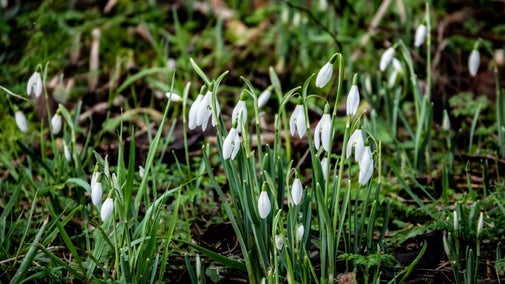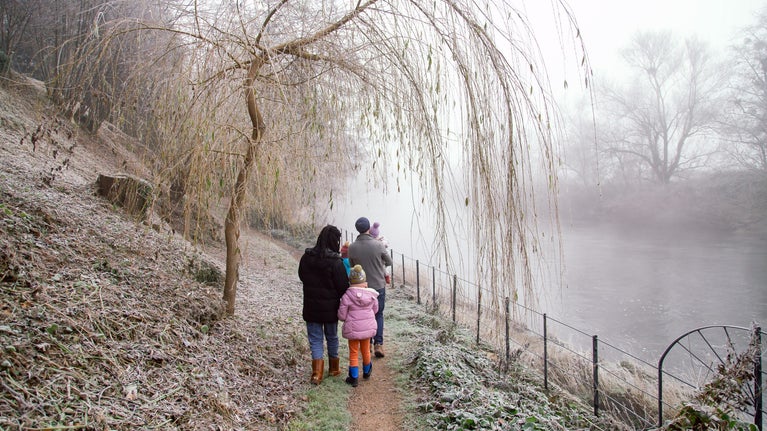
Discover more at The Weir Garden
Find out how to get to The Weir Garden, where to park, the things to see and do and more.
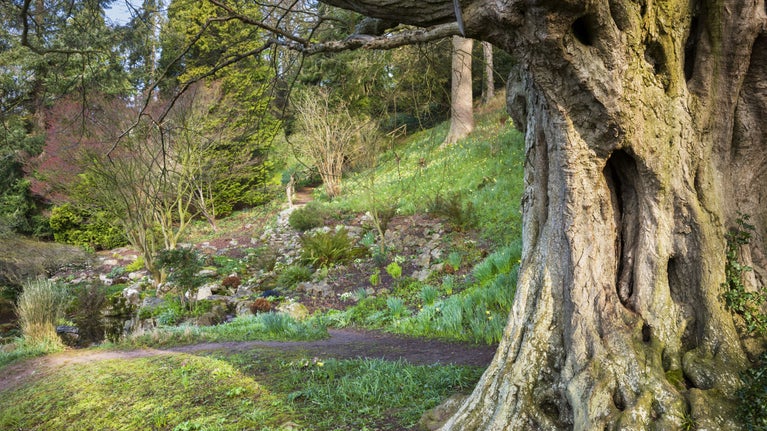
Discover the 10-acre site at The Weir Garden, split between the natural riverside garden and the productive walled garden and glasshouse. Here’s what to look out for when you visit, from views over the Wye Valley to an unusual walled garden, as well as the wildlife that visit and call The Weir Garden home.
A small section of paths in the riverside garden are currently closed as we carry out repair work and tree maintenance. Most paths in the riverside garden are still open.
Snowdrops are like a pretty winter promise; spring will soon be here and it’s refreshing to spot the first signs of new life after the Christmas season. Throughout January and February, swathes of snowdrops blanket the grassy spaces here at the Weir Garden creating a speckled carpet of white along the banks of the River Wye.
The Weir Garden is well-known for it's spring flower displays, with crocuses, primroses, and the occasional iris accompanying the scattering of snowdrop early in the season, before giving way to the daffodil displays in March.
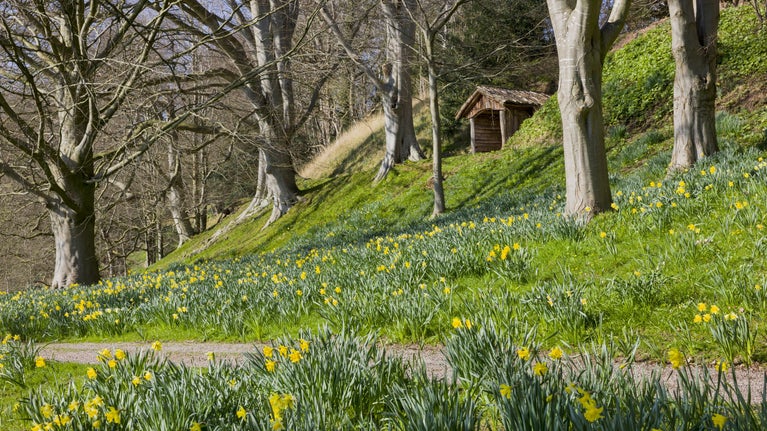
The riverside garden covers the area between the mansion house and the River Wye. The mansion is now a private nursing home, but the views from the top path take in the broad Wye Valley as it meanders across rural Herefordshire.
Built in 1920, the boathouse is hugely significant at The Weir, being one of only a few to remain alongside the Wye today. The boathouse is constructed from reinforced concrete and was cast in situ, with the retaining wall also built around the same time. Look out for otters that have been visiting the boathouse.
Highly fashionable during the 1920s, rockeries were alternative and attractive features for the garden. Many exotic trees were planted around the small pools and the mossy rocks provide a cool, damp setting for nature watching.
Built by Roger Parr in the 1950s, it was designed as a fisherman’s hut, a sheltered place to sit and enjoy the spectacular views in bad weather. The materials were locally sourced or from the estate and the hut was designed to blend in with the surroundings.
The floor is made up of river cobbles, white quartz and horses’ teeth. Look out for the teeth that were used to form a letter ‘P’ for Parr. The walls are made from rough elm timbers and the seat has been decorated with split birch to give it a truly rustic appearance.
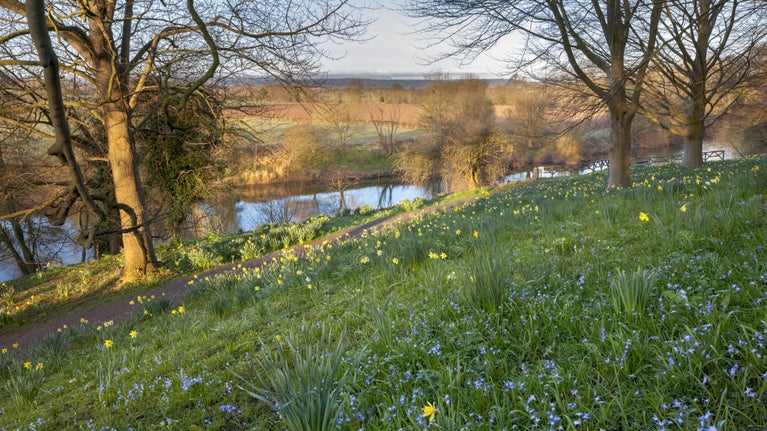
The walled garden at The Weir was designed by Humphry Repton and is a short walk through the orchard, past the sheep field until you reach the red-brick wall with the wooden door.
Just outside the wall you’ll see the early Georgian cold frames, which have been fully restored, then step through the big wooden door into a secret garden.
Unlike a standard walled garden, this one has just three sides to make the most of the sunshine and to enjoy the views of the River Wye. You can buy the home-grown goods, straight from the garden.
The crown of the restored walled garden is the 1920s glasshouse. Built in the 19th century by the same company that built Queen Victoria’s glasshouses, Foster & Pearson, it sadly fell into disrepair for over 50 years.
Thanks to our supporters, it was sympathetically restored, but now requires further conservation work so is closed for the time being. Work will continue until late autumn; why not take a look and see the work in action on your next visit? Records show the glasshouse was used all year round to grow mushrooms, asparagus and rhubarb, being forced over winter and the gardeners still plant in the same format today.
Enjoy a mile-long, circular walk around the parkland at The Weir Garden, exploring the rich history of the wider estate, discovering the huge variety of wildlife, and taking in the sweeping views over the Herefordshire countryside. The parkland walk starts near the welcome board in the car park.
Click here for more information about The Weir's parkland walk.
Thanks to the support of National Highways, we are embarking on a new project to restore over 65 hectares of priority habitat at The Weir Garden. By restoring meadowland, wood pasture, broadleaf woodland, and traditional orchards, we'll create a mosaic of diverse habitats for wildlife.
If you're visiting ask the team about this new project.

Find out how to get to The Weir Garden, where to park, the things to see and do and more.
The garden at The Weir is managed in a natural way to create a varied habitat for wildlife. You can see many species in the garden - from the otters and fish that live in the river, to the birds that nest here. In the wider estate we are in the process of restoring over 65 hectares of priority habitat.

The Weir Garden has a rich and varied history, from Roman settlement to family garden. Discover the stories of times past and learn about the garden’s history.

Neglected for 50 years, the walled garden was brought back to life. Find out about its restoration project.
Help maintain the natural beauty of The Weir Garden on the banks of the River Wye by joining the volunteer team.

From 18th-century water gardens and Arts and Crafts landscapes to intimate woodland gardens, there are so many places to discover.
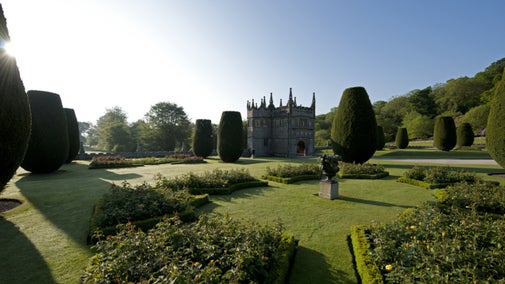
Discover our gardeners’ top tips so you can make the most of your garden, plot or window box.
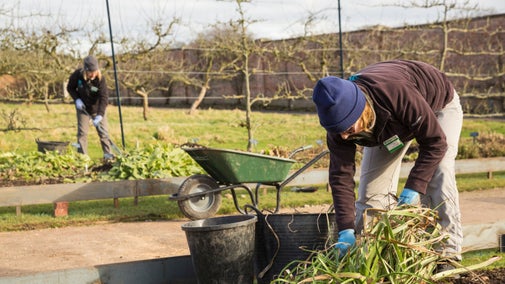
Discover veteran trees, sweeping parkland, historic orchards and river gardens, with exotic trees and vines that burst with colour throughout the year.
